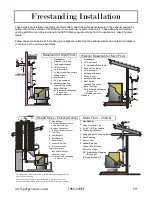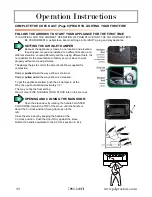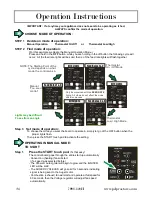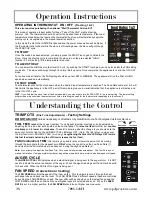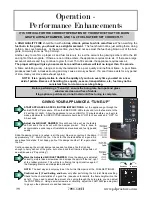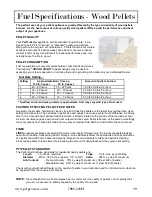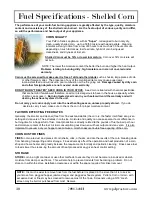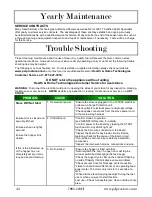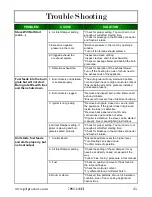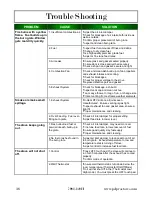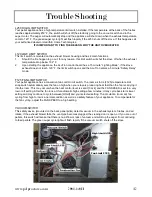
www.pelprostoves.com
7081-148H
33
FAN MOTORS:
C
lean the in-take on CONVECTION (ROOM AIR) fan as well as the air holes on the
motors of both COMBUSTION and CONVECTION fans annually.
FRESH AIR INTAKE
:
Inspect periodically to be sure that it is not clogged with any foreign materials. A
plugged screen will restrict or shut off combustion air and cause a fire to die or burn poorly.
GOLD / BRASS / NICKEL /PEWTER TRIM CLEANING:
Use a damp cloth to clean your door.
DO NOT USE ANY ABRASIVE CLEANERS AS YOU WILL REMOVE OR SCRATCH THE PLATING!
CHECK AND CLEAN THE HOPPER
:
Check the hopper periodically to determine if there is any sawdust or pellets that are sticking to
the hopper surface. Clean as needed. An excess build up of fines, will lead to improper feeding and possible
auger jams. You may wish to allow your hopper to run empty, to aid inspection and reduce saw dust.
HINT:
To aid in the fuel sliding easily down to the auger, you can wipe down the inside of the hopper with a car
wax.
GASKET INSPECTION:
Air leaks into the firebox will decrease the appliance’s performance greatly,
leading to excessive sooting inefficient burning and perhaps a malfunction.
Door Gasket
—Inspect the door gasket to make sure it is fully attached. Use stove gasket cement to re-attach
if necessary. If the door gasket is worn, badly torn or flattened, replace.
Ash Pan
—Remove the ashpan and inspect the gasket around the perimeter of the pan. Re-attach or replace
the gasket if necessary.
Glass Gasket
— There is no gasket across the top or bottom edges of the glass. This is to allow for air wash.
Check these areas for build-up or obstructions and clean as needed. The gasketing found on either side edge
of the glass does go completely around the corners on the top and bottom to act as a spacer for the glass.
If replacing this gasket, ensure the gasket covers the entire side and approximately 1 inch of the top and
bottom edges..
GLASS CLEANING :
We recommend using a high quality fireplace or stove glass cleaner or a vinegar
and water solution along with a rag. Oven cleaner and window cleaners will leave a film on the glass that will
attract smoke and creosote like a magnet. Should a build up of creosote or carbon accumulate you may wish
to use 000 steel wool and water to clean glass. Ceramic is very hard and will not scratch from the steel wool.
GLASS REPLACEMENT:
In the event you need replacement only Hi-Temp Neo-Ceram of the correct
size and thickness may be used. Contact your local
PelPro SERIES
dealer to obtain this glass.
DO NOT OPERATE STOVE WITH BROKEN GLASS AS LEAKAGE OF FLUE GASES MAY RESULT.
PAINTED SURFACES:
Painted surfaces may be wiped down with a damp cloth. If scratches appear or
you wish to renew your paint, contact your Dealer to obtain a can of Satin Black (“Stove Bright”) paint.
Tip:
use a hair dryer to warm the surface prior to touching up the paint, this helps to reduce paint runs.
Note: Do not use any other brand other than “Stove Bright” as they may not be compatible.
FALL START UP
:
Prior to lighting the first fire check the outside area around the exhaust and air intake
systems for obstructions. Clean the screens on the exhaust system and the outside air intake pipe. Turn all
controls on to make sure they are working prior to lighting the first fire. Clean and remove fly ash from exhaust
venting.
SPRING SHUTDOWN:
[COLD STOVE AND COLD ASHES ONLY]
. After the last burn in the spring
remove pellets from the hopper and the auger. Scoop out the pellets then run the auger until the hopper is
empty and pellets stop flowing. Vacuum out the hopper. Thoroughly clean the burn grate, burn box, ashtray
and ash traps. It’s desirable to spray the inside of the cleaned hopper with an aerosol silicone spray if your
stove is in a high humidity area. The
exhaust system
should be thoroughly cleaned.
Disassemble the EXHAUST FAN and CONVECTION FAN and clean off the internal fan blades.
Once you are finished, unplug the appliance for added electrical protection.
Maintenance
- Periodic Cleaning

